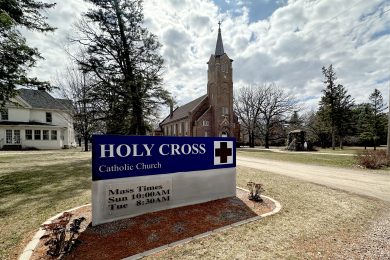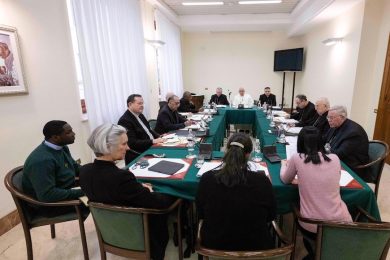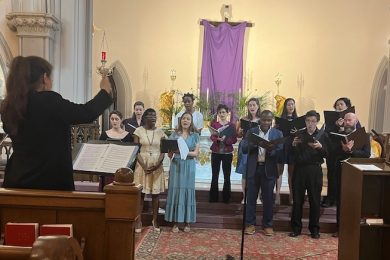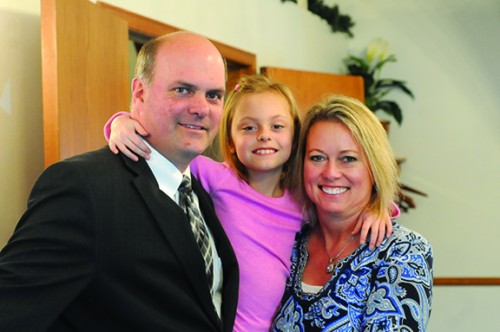Jim Wenner is well trained in the funeral home business. For more than 150 years, his family has owned and operated funeral homes in the Cold Spring and Richmond areas. Ever since he could walk, he remembers watching his father direct funerals and offer solace to grieving families.
While earning his bachelor’s degree in biology at St. John’s University, he participated in the ROTC program and finished his military service in the U.S. Army in May 2000.
Wenner then entered the University of Minnesota in the Twin Cities to complete a degree in mortuary science. By June 2001, he was working in the family business full time.
But none of his training prepared him for the grief of losing his own child.
Relying on faith, family

One day in 2002, Wenner was called to the home of Leroy “PI” Noll, who had just passed away. He knocked on the door and was met by Noll’s grown daughter, Sandy, who would later become Jim’s wife.
“I first met Jim when my father died,” Sandy said. “I have heard over and over that Jim is so caring and so giving. And I agree with them because that’s how I fell in love with him. He was not afraid to be there while people cried or even cry with them or give them a hug. Everybody always gets a hug from Jim.”
Jim and Sandy, members of SS. Peter and Paul Parish in Richmond, married in 2004 and found out they were expecting their first child in 2006. But just 23 weeks into her pregnancy, Sandy delivered their son James (Jamey) Michael Wenner II.
“He lived one week,” Sandy said. “People have asked us if we knew we’d only have him with us for a week, would we still want to go through it again, and our answer is always yes. Without a doubt.”
Some nine years later, the couple can reflect on the ways Jamey’s short life continues to touch them and the lives of others. After his death, each felt their faith was strengthened.
“That’s all that’s really there,” Jim said. “You have your family and you have God. What else do you have? You have to turn to your faith.”
He also said it made him a better funeral director, especially in cases where a child has died.
“I usually call for Sandy so we can both be here together,” he said. “There’s a different connection with the father and me than with the mother. There’s a mother-to-mother connection that I can’t relate to as well as another mother can,” Jim said.
“And it’s not that you can understand exactly what
they’re going through but they know you’ve been there, in the same place. There’s a connection,” Sandy added.
They also feel that their marriage is a strong witness to others grieving the loss of a child.
“In their grief, they can look at us and see that it’s nine years later for us and we are still a couple, we are still a family. I think that is a fear for a lot of people: ‘Is this going to pull us apart?’ It’s encouraging for others to see that we are still together, we are still a unit and we are able talk about our experience,” Sandy said.
Creating cherished memories
Seven years after Jamey died, almost to the day, the Wenners were called to visit a young couple, Meghan and Aaron Loch, at St. Cloud Hospital. Their son, Finnegan, had just passed away during childbirth.
“As parents we were obviously devastated,” Meghan said. “Jim and Sandy went above and beyond to make it as comforting and as peaceful for us as possible. They know firsthand what that horrible loss is like. They were so kind and compassionate.”

After Finnegan had been prepared for burial, the Wenners invited the Lochs to the funeral home.
“They actually let us come in and spend the day with him,” Meghan said. “How much greater our suffering would’ve been if we hadn’t had that time with our son. They let us dress him, put a diaper on him, put lotion on his body. It was the only time we ever dressed our baby. They gave us something that we can never thank them enough for.”
During the wake service, the Lochs sat in rocking chairs and gave everyone the opportunity to come up and touch Finnegan’s head.
“When you have a baby that dies during birth, you don’t get the opportunity to make memories with them in the way that other people do, so it’s so important to have that bonding time with them after they’ve passed. To get some peace, to have those memories to cherish, is the greatest gift and [the Wenners] really gave us that,” Meghan said.
Comforting others
Shortly after their son died, the Lochs, who attend St. Boniface Parish in Cold Spring, started Finnegan’s Foundation as a way to help other families who have lost children.
“Finnegan’s Foundation offers complete support for families. We do everything from helping with funeral arrangements to talking to people about their rights in the hospital to supporting families two years down the road in handling the loss of their child. It’s been a beautiful and exciting thing we can do to make connections with other parents who have lost children,” Meghan said.
She also said that some of the “ugly parts” that come from losing a child, the anger and the deep sorrow, don’t get talked about.
“Divorce rates and suicide rates are exponentially higher in parents that have lost a child. I couldn’t sit with that. I needed to make sure that any time I could, I was able to give support to a parent so they never felt alone or isolated,” she said.
Meghan writes a blog and has a Facebook page that she hopes will help others. There, she shared the story of Finnegan and also their daughter, Vienna, whom they lost to a late miscarriage shortly after Finnegan died. When the Wenners found out about Vienna, they donated a small urn so she could be buried next to her brother.
In October 2015, the Lochs gave birth to their third child who is a happy, healthy three-month-old named Griffin Finnegan, after his big brother.
“My husband and I both say how fortunate we were from the very beginning to be surrounded by people who understood the magnitude of our loss,” Meghan said.
“From the nurses in the hospital, to Jim and Sandy who opened up their hearts to us, to our family, to our friends and the community who embraced us. We look at those people in our lives and we saw the way they went to extreme measures to make sure we felt as comforted and taken in as possible. That’s always what we want to give back to others.”
Finding strength
In 2008, the Wenners welcomed their second child, Rose Josephine. Like Jamey, Rose also was born at just 23 weeks, weighing only 12 ounces.
“She’s really a special girl,” Sandy said. “We feel blessed every day by her.”
Rose just turned eight and is a second-grader at SS. Peter and Paul School in Richmond. Like her father did when he was a child, she, too, spends time around the funeral home. And Rose knows all about her big brother Jamey who lives in heaven. The Wenners say it is important for people to be honest with children about death and to pay attention to their grief, too.
Like any job, the funeral business can take its toll. Because they work in a small, close-knit community, they often know the people who have died. And, of course, emotions can run high.
“It all depends on the day,” Jim said. “Sometimes your anxiety level says this is going to be really tough and sometimes it not as bad as you think it’s going to be. With all of the tragedies here in Cold Spring — the high school shootings in 2003, and Officer Thomas Decker in 2012 — those were difficult times because the whole community is trying to heal themselves and we have to start somewhere.”
When asked where he finds the strength to get through those tough days, Jim lovingly pointed to Sandy.
“There are days when I get home from work and I need a hug, too,” he said.
Most important, Jim and Sandy believe that when they walk alongside someone who needs comforting, God’s grace sustains them. The Lochs believe that, too.
“With every person that was put in our path after Finnegan died, there is no other explanation but that it was God’s hand in our grief and our sorrow and God’s promise to us that while we were suffering so badly that there was going to be beauty and gentle hands in a time when we needed it the most. That was Jim and Sandy. It’s so much more to them than a business.”
Comfort the sorrowful: What does the church say?
By Maureen Otremba
For The Visitor
At first glance, this work of mercy may seem to involve “fixing” whatever causes suffering (or “afflicts”) another person. People are afflicted by many things: physical ailments, poverty, unemployment, mental health challenges, and relationship issues, to name only a few.
But when we consider that comforting the afflicted is actually a spiritual, rather than a corporal, work of mercy, the focus changes.
In corporal works of mercy, we are commissioned by Jesus Christ to see and minister to him in the person of those whose bodily needs we help to meet. “For I was hungry and you gave me food, thirsty and you gave me drink, a stranger and you welcomed me, naked and you clothed me” (Matthew 25: 35-36). It is not that we minister to them as though they were Christ; rather, we minister to them because they are Christ.
The heart of the spiritual works of mercy, however, is slightly different. What we seek to share with a person who is afflicted is the mercy of Christ, the compassion and consolation of his love. For aside from the circumstances of their affliction, people also bear the greater burden of finding meaning and an ultimate cause for joy in the midst of their suffering.
In this particular case, we are called to offer comfort by listening as Jesus listens, being present to and praying with the person, and ideally, leading him or her, as Jesus does, to the Father who is merciful, forgiving and able to sustain us in all of our needs.
This can be a challenge for us who live in a quick-fix culture. We want to help alleviate suffering, to make things better, to help people flourish. But the Christian tradition insists on the truth that there is meaning in the suffering itself. Not suffering for its own sake, but rather the way it leads us to acknowledge our very dependence on the God of mercy and love.
We may not be able to give solutions or even assistance to everyone who crosses our path. But the gift of our presence, attention, time and companionship may be the greater gift. Ultimately, this journeying with another person can lead to reliance on God that is at the very heart of Divine Mercy and expressed in the familiar, “Jesus, I trust in Thee!” In doing so, we echo the psalmist’s testimonial: “Only in God is my soul at rest; from him comes my salvation” (Psalm 62:1).
For reflection: How do you find solace in Jesus during times of suffering? How can you share that comfort with someone in your life who is afflicted?
Maureen Otremba is a writer and workshop presenter and is a member of Sacred Heart Parish in Sauk Rapids.






















